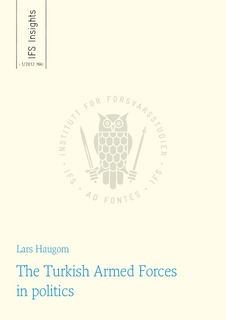| dc.description.abstract | Entrusted by law with the dual task of protecting the state and guarding its founding principles, the Turkish military has played a decisive role in shaping the political course since the founding of the republic of Turkey in 1923.
However, since the turn of the millennium, and in particular after 2002 when the religious-conservative Justice and Development Party (AKP) came to power, the character of civil–military relations in Turkey changed. Formerly the relationship was characterized by relatively weak civil-political institutions, on the one hand, and a strong military institution on the other. Over the last ten years, however, power relations have clearly changed in favour of the civilian institutions.
This issue of IFS Insight explores various explanations for the changes that have taken place in civil-military relations in Turkey since 2000, including the EU-accession process, changes in national threat perceptions, a period with strong civilian governments, the emergence of new elite groups, and changes both in the opinion of senior military officers and among the public concerning military intervention in politics. Against this background the issue also discusses if the military’s traditional guardianship role in Turkish politics is over. | no_NO |
